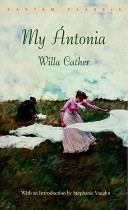 Willa Cather •
Willa Cather •
My Ántonia •
Willa Cather laid claim to the territory of Nebraska by writing about the land and people with steadfast, minutely observant love. Her words are like a force of nature, drawing their power from the seasons of the earth and the beating of the human heart. She exalts the commonplace through her deep attention.
During a train trip across the vast prairies, the book’s narrator, now grown, recalls his boyhood friendship with a spirited Bohemian servant girl. Ántonia is a few years older than Jim and he admires her unreservedly. When she sees him kill a rattlesnake, he is elevated to the status of hero in her eyes, and she boasts to everyone of his courage. (The snake gets considerably larger with each retelling, as snakes are apt to do.) Adult satisfactions pale by comparison.
Jim’s memories are tinged with regret as he wonders if he and Ántonia might have made a match. Images of her—”sunburned, sweaty, her dress open at the neck, and her throat and chest dust-plastered”—are etched into his mental landscape; she stands as a symbol of the hardworking immigrants who settled this region, with a resilience and strength unmatched by the more sophisticated town girls.
Cather can sketch the quietest scene and make it live in your senses forever: “haystacks turn[ing] rosy in the slanting sunlight”; a kitchen “heavenly safe and warm . . . like a tight little boat in a winter sea.” When a notorious philanderer drops a piece of hand-painted china, his wife declares grandly, “Mr. Cutter, you have broken all the Commandments—spare the finger-bowls!”
No one else has captured this slice of America so precisely and movingly. Like Steinbeck with California’s Salinas Valley, Cather was born to give voice to the stories of the Great Plains.






I’ve never read anything completely through by her, but this review inspires me to change that! Thank you.
I agree–the beauty is in the writing of minute detail and memoir-like “memories” of that time and place.